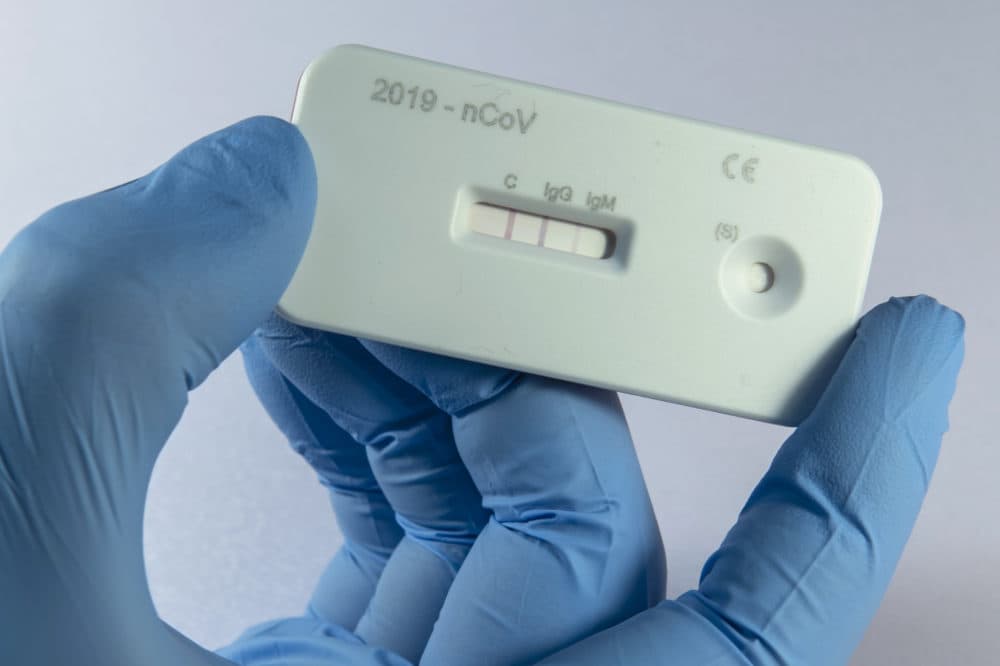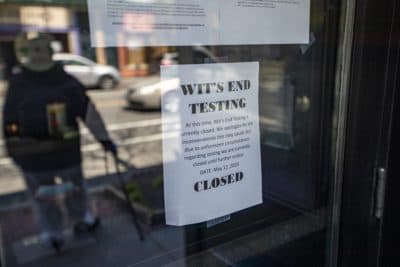Advertisement
Coronavirus Coverage
Was That COVID-19? Antibody Tests Promise Answers But Beware Of Their Limits

In mid-February, a nasty bug hit Matt Kelly’s whole Cambridge family. First, his wife, Annie, a teacher, got the fever, fatigue and cough, and lost her sense of smell.
"And then it rapidly spread to me," said Kelly, who publishes a newsletter on corporate legal affairs. "And then rapidly to our son, who’s in kindergarten, and our daughter, who is in pre-school. All of our symptoms fit all of the symptoms of COVID-19."
Kelly tested negative for flu and strep. It sure seemed like the coronavirus. It was so infectious that half the students in his son’s class got sick. But, speaking back in mid-March, he said he had no way to know for sure, because there were no tests available for the antibodies that show a patient has had COVID-19.
"I’m not trying to talk myself into a false delusion that I’ve already had COVID, I’m cured, I’m immune, I can go be a hero," he said. "We cannot prove or disprove this idea right now, that we may have had COVID, and it may already have cleared our system."

Now, in mid-May, that is changing, for Kelly and many others. Antibody testing is starting to become so available that it was even recently offered in a Cambridge bar, called Wit’s End. (That is, until the city closed it down on Tuesday, saying the testing violated the bar’s zoning.)
A chain of urgent care centers called PhysicianOne Urgent Care has been offering antibody tests at its four Massachusetts locations, among others, since April 30.
"We’re seeing a lot of interest in getting tested," said Dr. Jeannie Kenkare, its chief medical officer. Insurance is expected to cover the tests, she said, and she estimates that between 350 and 420 Massachusetts residents have gotten tested so far.
"The majority of these people are folks who had symptoms that were similar to COVID but didn’t have an opportunity to get tested, because the testing wasn’t available for them at the time they had their symptoms," she said.
Advertisement
PhysicianOne is using a highly accurate test through the lab company Quest Diagnostics, Kenkare said.
But in general, there have been and remain major issues with the accuracy of antibody testing. On Thursday, the American Medical Association warned that most of the 120 tests now on the market have not been approved by the FDA, and that a positive antibody test is by no means a reason to stop physical distancing.
Many public health experts say antibody testing is critically important at a broad level to determine how widespread the virus is and track its course; it is use of the testing by individuals that worries them.
The greatest concern with antibody tests, said Dr. Benjamin Stein from the testing site at the bar Wit’s End, revolves around false positives.
"A patient is falsely reassured that they have antibodies and that means something to them about their immunity," he said. "And they thereby go out and potentially get an infection and spread it to others. That’s the last thing we want to facilitate in any way, shape or form."
So he and others who do the testing carefully explain the limitations of what the tests mean. But academic experts like Michael Mina from the Harvard Chan School of Public Health still express concern, particularly about at-home antibody tests that could be damaged in transit.
"So until some of those issues are worked out, and you have really credible sources of these tests and they've become a little bit more stable, I think that people shouldn't consider them as anything more than a toy," Mina said.
His Harvard Chan colleague, epidemiologist Yonatan Grad, points out an even more basic problem: "One of the reasons why people are so enthusiastic in taking these tests is the hope that it would indicate that they are 'immune privileged' — that they have had the infection and now they’re immune," he said. "While that’s likely the case, we don’t know that for sure."
Antibody tests 'do not tell you whether you are protected from getting reinfected by the virus. They do not tell you whether you are still potentially able to infect others.'
Prof. David Walt
Having antibodies does not always mean protection — as with HIV, for example. As Harvard pathology professor David Walt puts it, even accurate coronavirus antibody tests today tell you just one thing: "Have you been exposed to the virus?"
"They do not tell you whether you are protected from getting reinfected by the virus," he said. "They do not tell you whether you are still potentially able to infect others."
Walt and others are working to determine how to test for protection rather than just exposure, but that research is still in early stages.
An antibody test can be used to satisfy curiosity, he said, but people should be extremely careful how they act on the information.

Dr. Stein from the Wit’s End bar testing site agreed, but also said he can imagine scenarios where an antibody test could help with decisions. For example, if one family member falls ill, maybe another family member who’s had COVID-19 symptoms and a positive antibody test should be the caregiver.
Matt Kelly from Cambridge is not looking to make any decisions right now. He would just like to know whether he and his family had COVID-19 in February. So, he recently went to get his blood drawn for an antibody test through PhysicianOne Urgent Care. Four days later, he got the result: negative.
He asked how many negative results like his were wrong, he said, and the technician on the phone said 20%.
"Which means, really, that I still don’t feel very confident that I know if I had it, or I didn’t," he said. "I don’t really care what the answer is so long as I know it’s accurate. That seems to be the elusive thing right now."
This segment aired on May 15, 2020.
